The commercial real estate landscape in Atlanta’s suburbs is undergoing a significant transformation as declining demand leads to the demolition of office buildings for new developments.
In the suburbs of Atlanta, the commercial real estate landscape is undergoing a significant transformation, with an increasing number of office buildings being demolished to make way for new, more desirable developments. This trend is a response to the declining demand for suburban office space, which has seen values plummet in recent years. As a result, many property owners have concluded that their buildings are now worth only the land they occupy.
Brian Granath, a partner at OA Development, characterised the situation by stating, “I never thought I would see that, but that’s where we are in the cycle.” The reality is that the suburban office market is saturated, with a particularly notable increase in vacancies. Data from Partners Real Estate indicates that between the first quarter of 2020 and the third quarter of 2024, approximately 3 million square feet of office space was returned to the market, resulting in a vacancy rate that soared to an all-time high of 23%.
This trend can be traced back to the suburban development boom that began in the mid-1990s, during which office space in the Atlanta suburbs expanded from 62.3 million square feet to 96.2 million square feet between 1996 and 2001. Jodi Selvey, Vice Chair at Colliers, noted the appeal of suburbs like North Fulton, Cobb, and Gwinnett, particularly due to affordable land prices and the proximity to affluent residential communities.
However, the demand that developers like Bridge Investment Group anticipated has not materialised. The firm had previously invested $41 million in the Brookside office park, constructed in 2000, expecting a resurgence in demand for suburban office space. Less than four years later, they are now selling the property to Portman Holdings, which plans to demolish one of the buildings and replace it with a mixed-use development featuring apartments and retail spaces. Gregg Metcalf, who developed Brookside, remarked, “It’s personal… we’re tearing it down in 2024.”
Further illustrating the shift, Transwestern’s Senior Managing Director, Kevin Markwordt, expressed astonishment at the current state of the market, stating, “We’re selling office buildings at high-density residential land value. I never thought that would happen.” This reflects a broader trend where the land beneath aging commercial buildings is becoming more valuable to developers looking to build housing or mixed-use spaces.
The rapid rise in demand for residential properties cannot be ignored; rents in the Atlanta region increased by 41% from 2018 to 2023, while home prices surged by 67% over the same period. The confluence of these factors has made the transformation of underperforming office buildings into residential or mixed-use developments a compelling option for many developers.
Notably, D.R. Horton recently acquired the 3585 Engineering Drive office building, built in 1996, for $7.5 million, with plans to replace it with 75 townhomes. Similarly, Terwilliger Pappas purchased Embassy Row 100, a mid-rise office building, for $18.25 million, aiming to develop an apartment community on the site.
Local cities are now grappling with the implications of this shift. Peachtree Corners, for example, has enacted a moratorium on new residential and mixed-use proposals to reassess its office inventory and ensure the stability of its commercial stock, which contributes significantly to its tax revenues. Mayor Mike Mason highlighted the challenge of balancing the needs of the community while ensuring economic viability.
As these changes unfold, many property owners are weighing the long-term prospects of their assets. Granath indicated that OA Development is also considering the suitability of its own suburban office building for redevelopment, dependent on rezoning and local governmental cooperation. The shift from suburban office space to mixed-use and residential developments illustrates the evolving priorities and demands within the commercial real estate landscape in Atlanta and mirrors a broader trend seen across various metropolitan regions.
Source: Noah Wire Services
- https://www.bisnow.com/atlanta/news/office/growing-number-of-suburban-offices-destined-for-the-wrecking-ball-127272 – Corroborates the increasing number of office building demolitions in Atlanta’s suburbs, the decline in demand for suburban office space, and the rise in vacancies.
- https://www.bisnow.com/atlanta/news/office/growing-number-of-suburban-offices-destined-for-the-wrecking-ball-127272 – Provides data from Partners Real Estate on the return of 3 million square feet of office space to the market and the resulting high vacancy rate.
- https://www.bisnow.com/atlanta/news/office/growing-number-of-suburban-offices-destined-for-the-wrecking-ball-127272 – Details the suburban development boom of the mid-1990s and the expansion of office space in Atlanta suburbs, as noted by Jodi Selvey.
- https://www.bisnow.com/atlanta/news/office/growing-number-of-suburban-offices-destined-for-the-wrecking-ball-127272 – Discusses the sale of the Brookside office park and plans for its redevelopment into a mixed-use development, as mentioned by Gregg Metcalf.
- https://www.bisnow.com/atlanta/news/office/growing-number-of-suburban-offices-destined-for-the-wrecking-ball-127272 – Quotes Kevin Markwordt on selling office buildings at high-density residential land value, reflecting the broader trend of land value increase.
- https://www.bisnow.com/atlanta/news/office/growing-number-of-suburban-offices-destined-for-the-wrecking-ball-127272 – Mentions the consideration by OA Development to redevelop one of its suburban office buildings, dependent on rezoning and local governmental cooperation.
- https://www.bisnow.com/atlanta/news/office/growing-number-of-suburban-offices-destined-for-the-wrecking-ball-127272 – Describes the moratorium on new residential and mixed-use proposals in Peachtree Corners to reassess its office inventory, as stated by Mayor Mike Mason.
- https://livinginpeachtreecorners.com/2022/business/intuitive-surgical-to-demolish-buildings-in-tech-park/ – Provides an example of office building demolition in Peachtree Corners for new developments, such as Intuitive Surgical’s training facility.
- https://www.dhgriffin.com/projects/demolition/hammond-exchange-building.aspx – Details a specific demolition project, the Hammond Exchange Building, which was demolished to make way for new development.
- https://www.bisnow.com/atlanta/news/office/growing-number-of-suburban-offices-destined-for-the-wrecking-ball-127272 – Explains the economic implications for local cities, such as Peachtree Corners, due to the shift from office to residential and mixed-use developments.
- https://www.bisnow.com/atlanta/news/office/growing-number-of-suburban-offices-destined-for-the-wrecking-ball-127272 – Highlights the broader trend of transforming underperforming office buildings into residential or mixed-use developments in the Atlanta region.
















